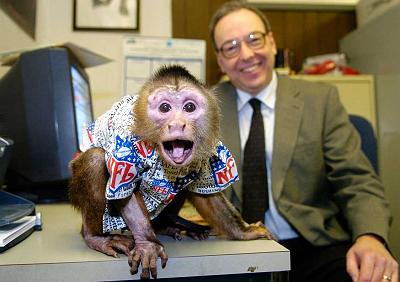
It’s amazing how often Monkeys and Money come up in
conversation.
First, there is the proof that money is in our DNA like
sex. Monkeys proved it in a Yale
University exercise back in 2009.
Second, monkeys are continually used to prove that they can
invest better than fund managers. A bit
like monkeys make better astronauts, even though they have yet to invent a
rocket, monkeys can make more money than anyone investing funds on your behalf.
The monkey investor became legend after Princeton University
economist Burton Malkiel said, in his 1973 book A Random Walk Down Wall Street: “A blindfolded monkey throwing darts
at a newspaper's financial pages could select a portfolio that would do just as
well as one carefully selected by the experts.”
OK, now there’s a challenge and one that the Wall Street Journal felt more than
capable of standing up to.
As a result, the WSJ started a monkey versus manager contest
in 1988 and continued until 2002. They
tried to show that more often than not the manager would win but stopped the
contest in 2002 as the monkeys – their editors – were probably
starting outperform the fund manager.
Nevertheless it has not stopped the Daily Mail reporting that Lusha
the chimpanzee outperforms 94% of Russia bankers with her investment portfolio in 2010 or Marketwatch showing the monkeys can be better stockpickers than a bunch of Harvard MBAs in
2011.
I've even blogged about it here a few times:

Stockpicking Monkey Adam Monk, as discussed back in 2008
So I was amused by this press release from Cass Business
School that landed in my inbox this week: Monkeys
beat market cap indices.
Sure, and I’m a monkey’s uncle. What’s all this about?
Researchers at Cass Business School have found that equity
indices constructed randomly by ‘monkeys’ would have produced higher
risk-adjusted returns than an equivalent market capitalisation-weighted index
over the last 40 years.
A study based on monthly US share data from 1968 to 2011
found nearly all 10 million indices weighted by chance delivered vastly
superior returns to the market cap approach – a discovery likely to come as a
blow to investors that have billions of dollars worldwide invested on a market
cap-weighted basis.
The finding comes from two papers published by Cass Business
School’s Cass Consulting, which investigated alternative methods of
constructing equity indices.
Download
Paper 1 and / or Download
Paper 2
Co-author of the
research, Professor Clare, explained: “We programmed a computer to randomly
pick and weight each of the 1,000 stocks in the sample; we effectively
simulated the stock-picking abilities of a monkey. The process was repeated 10 million times
over each of the 43 years of the study.
“The results of this experiment showed that many of the
monkey fund managers would have generated a superior performance than was
produced by some of the alternative indexing techniques. However, perhaps most shockingly we found
that nearly every one of the 10 million monkey fund managers beat the
performance of the market cap-weighted index.”
Maybe I should be a
monkey’s uncle.
Chris M Skinner
Chris Skinner is best known as an independent commentator on the financial markets through his blog, TheFinanser.com, as author of the bestselling book Digital Bank, and Chair of the European networking forum the Financial Services Club. He has been voted one of the most influential people in banking by The Financial Brand (as well as one of the best blogs), a FinTech Titan (Next Bank), one of the Fintech Leaders you need to follow (City AM, Deluxe and Jax Finance), as well as one of the Top 40 most influential people in financial technology by the Wall Street Journal's Financial News. To learn more click here...

